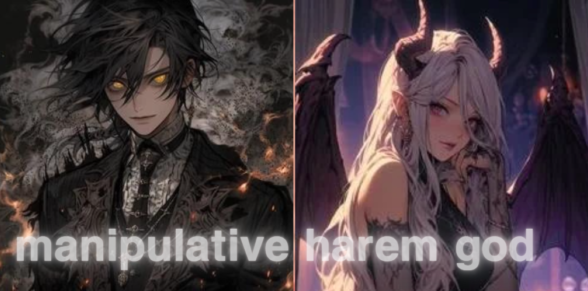Manipulative Harem God: A Deep Dive into the Complex World of Power, Intrigue, and Romance
The concept of the “Manipulative Harem God” has emerged as a captivating and controversial trope within various media, particularly in the realms of literature, anime, and webcomics. This trope, characterized by a central figure who uses cunning, manipulation, and sometimes dark tactics to build and control a group of followers—often romantic interests—has sparked both fascination and criticism among audiences.
In this comprehensive article, we will explore the intricacies of the “Manipulative Harem God” trope, examining its origins, evolution, and impact on modern storytelling. We will also delve into the psychological and sociocultural factors that contribute to its popularity, while offering unique interpretations and insights that go beyond what’s already available online.
By the end of this article, you will have a thorough understanding of the “Manipulative Harem God” and its place in contemporary media.
Understanding the “Manipulative Harem God” Trope
What Is a Manipulative Harem God?
The “Manipulative Harem God” is a character archetype typically depicted as an individual with extraordinary intelligence, charisma, and the ability to manipulate others to achieve their goals. This character often leads a harem—a group of followers, usually comprising multiple romantic interests—whom they control through psychological tactics, persuasion, and sometimes even deception. The “Manipulative Harem God” is not just a leader but a master puppeteer, orchestrating events and relationships to maintain their power and influence.
Origins of the Trope
The origins of the “Manipulative Harem God” can be traced back to ancient mythologies and literature, where gods and deities often wielded power over mortals, sometimes engaging in manipulative and deceitful behaviors to achieve their desires. These stories laid the groundwork for the modern interpretation of the trope, which has been further developed in contemporary anime, manga, and web novels.
One of the earliest examples in modern media can be found in classic literature, such as the works of Machiavelli, where the use of manipulation and cunning as tools of power is explored. However, it wasn’t until the rise of the isekai (another world) genre in Japanese anime and manga that the “Manipulative Harem God” trope truly began to take shape.
Evolution of the Trope in Modern Media
In recent years, the “Manipulative Harem God” has evolved into a more complex and nuanced character type. Initially portrayed as a villainous figure, this archetype has expanded to include anti-heroes and even protagonists who use their manipulative abilities for what they perceive as the greater good.
This evolution reflects a broader trend in storytelling, where characters are no longer confined to traditional moral binaries of good and evil. Instead, the “Manipulative Harem God” embodies the gray areas of morality, challenging audiences to question their own perceptions of right and wrong.
The Psychological Appeal of the Manipulative Harem God
Power and Control
At the core of the “Manipulative Harem God” trope is the theme of power and control. This character’s ability to manipulate others taps into a deep-seated human fascination with dominance and authority. For many, the idea of possessing such power—especially in the realm of relationships—is both intriguing and alluring.
The trope also allows audiences to explore the darker aspects of human nature in a safe, fictional context. By watching or reading about a “Manipulative Harem God,” individuals can vicariously experience the thrill of manipulation and control without the moral consequences that would accompany such behavior in real life.
The Complexity of Relationships
The “Manipulative Harem God” trope also delves into the complexities of relationships, particularly those involving multiple romantic interests. The character’s ability to navigate and control these relationships adds layers of intrigue and drama to the narrative, making it more engaging for audiences.
Moreover, this trope often explores themes of loyalty, trust, and betrayal, which resonate with many people on a personal level. The “Manipulative Harem God” may use their influence to test the loyalty of their followers, creating tension and conflict that drive the story forward.
The Allure of the Anti-Hero
In many cases, the “Manipulative Harem God” is portrayed as an anti-hero—a character who operates outside traditional moral boundaries but is still sympathetic or relatable in some way. This aspect of the trope appeals to audiences who are drawn to complex, morally ambiguous characters.
The anti-heroic qualities of the “Manipulative Harem God” also allow for more diverse and unpredictable storytelling. Because these characters are not bound by conventional notions of right and wrong, they can take the narrative in unexpected directions, keeping audiences on the edge of their seats.
Cultural and Sociological Implications
Reflections of Patriarchy and Gender Dynamics
The “Manipulative Harem God” trope often reflects traditional patriarchal structures, where a dominant male figure exerts control over a group of women. This dynamic can be seen as a commentary on gender roles and power imbalances in society, with the harem representing the objectification and subjugation of women.
However, it’s important to note that not all depictions of the “Manipulative Harem God” reinforce these stereotypes. Some narratives subvert or critique these power dynamics, offering alternative perspectives on gender and relationships. For example, in some stories, female characters within the harem may challenge or resist the manipulative tactics of the central figure, ultimately reclaiming their agency.
The Impact of Cultural Context
The popularity and interpretation of the “Manipulative Harem God” trope can vary significantly across different cultural contexts. In Japan, where the trope is most commonly found, it often serves as a fantasy escape for individuals seeking to explore power dynamics in a fictional setting.
In contrast, Western audiences may interpret the trope through the lens of their own cultural values, such as individualism and gender equality. This can lead to differing opinions on the ethical implications of the “Manipulative Harem God,” with some viewers embracing the character’s complexity while others criticize the potential reinforcement of harmful stereotypes.
The Role of Fantasy in Exploring Real-World Issues
The “Manipulative Harem God” trope also highlights the role of fantasy in addressing real-world issues. By creating a fictional character who embodies manipulation and control, storytellers can explore themes of power, morality, and relationships in a way that is both entertaining and thought-provoking.
This approach allows audiences to engage with these issues on a deeper level, prompting them to reflect on their own beliefs and experiences. In this sense, the “Manipulative Harem God” serves as a mirror, reflecting both the allure and dangers of power in human interactions.
Notable Examples of Manipulative Harem Gods in Media
Zhang Wei: A Case Study
One of the most compelling examples of a “Manipulative Harem God” is Zhang Wei, the protagonist of a popular web novel series. Zhang Wei’s story begins with tragedy—he loses both of his parents at a young age and is forced to flee his village to avoid capture by the police. This traumatic experience shapes his worldview, leading him to develop a ruthless, survivalist mentality.
As Zhang Wei grows older, he hones his skills in manipulation and deception, eventually amassing a group of followers who are drawn to his charisma and power. However, his relationships are built on a foundation of control and fear, rather than genuine affection. Zhang Wei’s ability to manipulate those around him is both his greatest strength and his ultimate downfall, as it isolates him from true human connection.
Light Yagami from Death Note
While not a traditional harem leader, Light Yagami from the anime Death Note shares many characteristics with the “Manipulative Harem God.” Light uses his intelligence and the power of the Death Note to manipulate those around him, including his followers and even his enemies. His actions are driven by a desire for power and control, much like the archetypal “Manipulative Harem God.”
Light’s journey from idealistic high school student to ruthless dictator serves as a cautionary tale about the dangers of unchecked power. His downfall is ultimately brought about by his inability to maintain the delicate balance of manipulation and control, leading to his exposure and demise.
Lelouch Lamperouge from Code Geass
Lelouch Lamperouge, the protagonist of Code Geass, is another example of a character who embodies the “Manipulative Harem God” trope. Lelouch uses his strategic mind and the power of Geass to build a loyal following, which he manipulates to achieve his goals of overthrowing a tyrannical empire.
Lelouch’s manipulative tactics are driven by a sense of justice and a desire to protect those he loves. However, his methods often involve deception and sacrifice, leading to moral ambiguity and internal conflict. Like many “Manipulative Harem Gods,” Lelouch’s story is one of both triumph and tragedy, as his actions have far-reaching consequences for those around him.
The Ethical Dilemmas of the Manipulative Harem God
The Morality of Manipulation
One of the central ethical dilemmas of the “Manipulative Harem God” trope is the morality of manipulation. While these characters often justify their actions as necessary for achieving their goals, their tactics raise important questions about the ethical implications of using others for personal gain.
In many cases, the “Manipulative Harem God” operates under the belief that the ends justify the means. However, this mindset can lead to a slippery slope, where the character becomes increasingly detached from the consequences of their actions. This detachment often results in a loss of empathy and a disregard for the well-being of others.
The Impact on Relationships
The “Manipulative Harem God” trope also raises questions about the nature of relationships. When a character uses manipulation to control their followers, the authenticity of those relationships comes into question. Are the followers truly loyal, or are they simply pawns in the manipulator’s game?
This dynamic can lead to a sense of isolation for the “Manipulative Harem God,” as they are unable to form genuine connections with others. The lack of trust and mutual respect in these relationships often results in their eventual collapse, leading to the character’s downfall.
The Consequences of Power
Finally, the “Manipulative Harem God” trope explores the consequences of power. While these characters often achieve great success through their manipulative tactics, their power comes at a cost. The more they manipulate others, the more they distance themselves from their humanity, leading to a gradual erosion of their moral compass.
In many stories, the “Manipulative Harem God” ultimately faces the consequences of their actions, whether through betrayal, loss, or death. This outcome serves as a reminder that power, when wielded without ethical consideration, can lead to destruction and ruin.
The Future of the Manipulative Harem God in Media
The Evolution of the Trope
As storytelling continues to evolve, so too will the “Manipulative Harem God” trope. Future depictions of this archetype are likely to explore even more complex and nuanced portrayals of power, manipulation, and relationships. We may see characters who challenge traditional notions of morality, blurring the lines between hero and villain.
Additionally, the trope may expand to include more diverse representations, with characters of different genders, backgrounds, and motivations taking on the role of the “Manipulative Harem God.” This diversity will add depth and richness to the trope, allowing for new and innovative storytelling possibilities.
The Role of Technology
Technology will also play a significant role in the future of the “Manipulative Harem God” trope. With the rise of social media, artificial intelligence, and virtual reality, new forms of manipulation and control will emerge, providing fresh material for storytellers to explore.
For example, a “Manipulative Harem God” in a futuristic setting might use advanced technology to manipulate the emotions and behaviors of their followers, raising new ethical questions about the role of technology in human relationships.
The Enduring Appeal of the Trope
Despite its evolution, the core appeal of the “Manipulative Harem God” trope is likely to endure. The themes of power, control, and moral ambiguity resonate with audiences on a fundamental level, ensuring that this archetype will continue to captivate and challenge viewers and readers for years to come.
FAQs
What is a “Manipulative Harem God”?
A “Manipulative Harem God” is a character archetype typically depicted as an individual who uses manipulation, cunning, and psychological tactics to control a group of followers, often comprising multiple romantic interests. This character is known for their intelligence, charisma, and ability to orchestrate events and relationships to maintain power and influence.
Why is the “Manipulative Harem God” trope popular?
The “Manipulative Harem God” trope is popular because it taps into themes of power, control, and moral ambiguity. These characters are often complex and multifaceted, challenging traditional notions of good and evil. The trope also allows audiences to explore the darker aspects of human nature in a fictional setting.
What are some examples of “Manipulative Harem Gods” in media?
Notable examples of “Manipulative Harem Gods” in media include Zhang Wei from a popular web novel series, Light Yagami from Death Note, and Lelouch Lamperouge from Code Geass. These characters are known for their strategic minds, manipulative tactics, and complex relationships with their followers.
Are “Manipulative Harem Gods” always male?
While the trope traditionally features male characters, there is potential for more diverse representations in the future. Female characters or those of different backgrounds could also take on the role of the “Manipulative Harem God,” offering new and innovative storytelling possibilities.
What are the ethical implications of the “Manipulative Harem God” trope?
The “Manipulative Harem God” trope raises important ethical questions about the morality of manipulation, the authenticity of relationships, and the consequences of power. These characters often operate under the belief that the ends justify the means, leading to complex and morally ambiguous narratives.
Conclusion
The “Manipulative Harem God” is a compelling and multifaceted trope that has captured the imagination of audiences worldwide. Its exploration of power, control, and moral ambiguity offers rich material for storytelling, allowing for complex and thought-provoking narratives.
As the trope continues to evolve, it will undoubtedly remain a prominent and influential part of contemporary media. Whether viewed as a cautionary tale or a captivating fantasy, the “Manipulative Harem God” will continue to challenge and engage audiences, making it a staple of modern storytelling.






